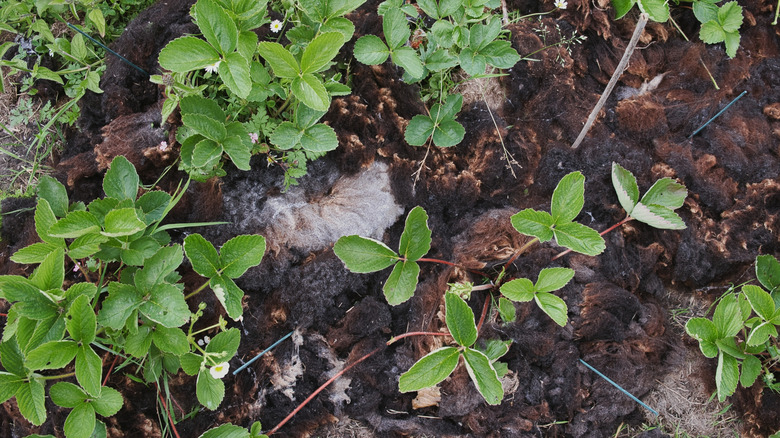The Trick Smart Gardeners Use To Avoid Dried Out Strawberries
We may receive a commission on purchases made from links.
Strawberries (fragaria spp.) are a delightfully sweet fruit that can be grown practically anywhere in USDA hardiness zones 2 to 10. You can even cultivate these versatile plants indoors if you choose the right strawberry variety. While growing even the smallest strawberry will always be an accomplishment, fruits that become dried out may be more trouble than they're worth. Luckily, there's a simple, smart trick you can use to avoid the disappointment of harvesting sad, dehydrated strawberries. Before you sow a batch of strawberry seeds, prepare the soil by adding some sheep wool to the garden plot.
Horticultural wool is a great natural fiber to use in mulch with numerous benefits, many to do with improving the quality of the soil. Wool can make spaces for air in the soil and imbue it with helpful nutrients like nitrogen and calcium. Most important when it comes to avoiding dried out strawberries, sheep wool can absorb and retain water to maintain plants' moisture levels.
Sheep wool keeps strawberry soil moist
For juicy, healthy fruit, growing strawberries need an inch of water every week. However, they also require around eight hours a day of sun, which can lead to their soil quickly drying out before the berries can soak up the necessary moisture. Wool's super absorbent properties solve this issue since blanketing a layer over developing strawberry seeds will supply them with a source of moisture. As long as you're working on keeping your strawberries hydrated, check out the essential watering tip you should know for thriving strawberry plants.
There are a few methods to effectively use horticultural wool in the garden. To capitalize on its use as a fertilizer, mix pieces into a compost heap or soil. The wool won't start emitting nutrients until it breaks down (which can take a year), but once it does, you'll be left with a completely natural, fertile soil mix that you can use to improve the growth of any plant. You can also place wool directly over soil to act as mulch, which can be helpful when protecting a garden plot from weeds or cold conditions. If you don't have a local supply of sheep wool handy, you can buy sheep wool pellets for horticultural use direct from Amazon.

